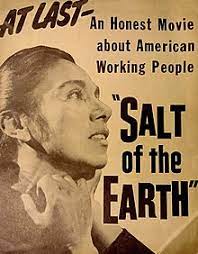
Esperanza Quintero (Rosaura Revueltas) is married to Ramon (Juan Chacon), has two children, and is pregnant with her third. Ramon works in the Delaware Zinc Inc. mine. The miners are mostly Hispanic and are paid less than their White counterparts. Other conditions of the mine make it dangerous for the workers. They are part of a union but their union has less power than the White unions at other mines. When one of the workers is injured in an accident the other workers are upset and call for a meeting.
The workers vote to go on strike. The mine owners refuse to negotiate and the strike goes on for months. Ramon is beaten up and arrested on a fake charge. At the same time Esperanza is giving birth to their daughter. Ramon is in jail for a month as the strike goes on. The company manages to get a Taft-Hartley Act injunction against the miners. The injunction states that any miner who pickets will be arrested. The miner’s wives come up with a solution. The women take their husbands’ place on the picket line. Some of the men have a problem with the women taking over. Machismo gets in the way of common sense. Eventually they have no choice.
The mine owners resort to having some of the women picketers arrested. With the women in jail the men are stuck taking care of the children and doing chores. It is then that they realize how bad off the women actually had it.
“Salt of the Earth” was released in 1954 and was directed by Herbert J. Biberman. It is a historically based drama and propaganda. The film is centered on a real strike in 1951 against the Empire Zinc Company in Grant County, New Mexico. The film encompasses political and social themes as well as feminist views. In 1992, the film was added to the National Film Registry.
The film was made during the McCarthy era. The director, screenwriter and producer had all been blacklisted at the time and were not allowed to work in Hollywood. As a result, the film was independently made and sponsored by the International Union of Mine, Mill and Smelter Workers.
Since they were being persecuted anyway, the filmmakers decided to make the film as pro-Communist as possible. The film had lots of issues to overcome. They were harassed and confronted by several citizens’ organizations. Labeled as subversive, the movie itself was blacklisted. It was denounced by the House of Representatives and the filmmakers were investigated by the FBI. The film was subject to as much suppression as the miners depicted in the film.
The movie only had five actors. The remaining cast was made up of local amateur actors or union members of the local Mine, Mill and Smelter Workers Union.

